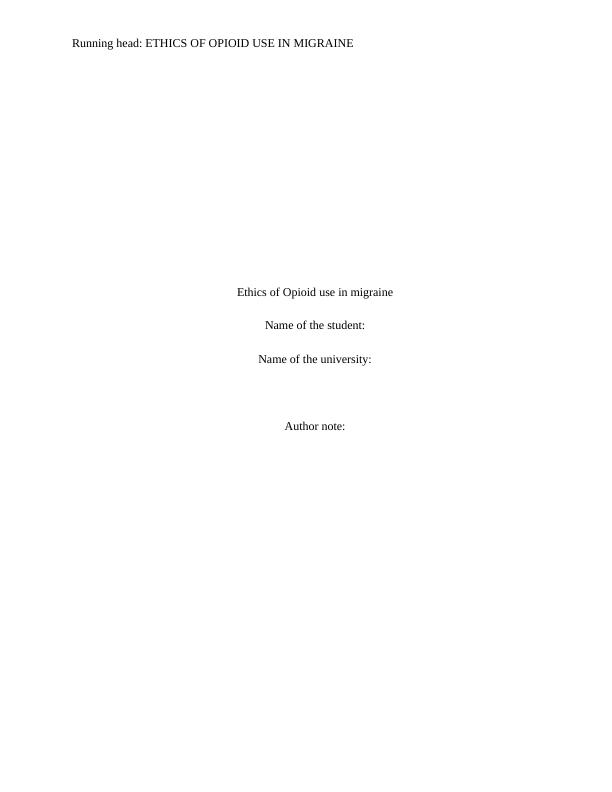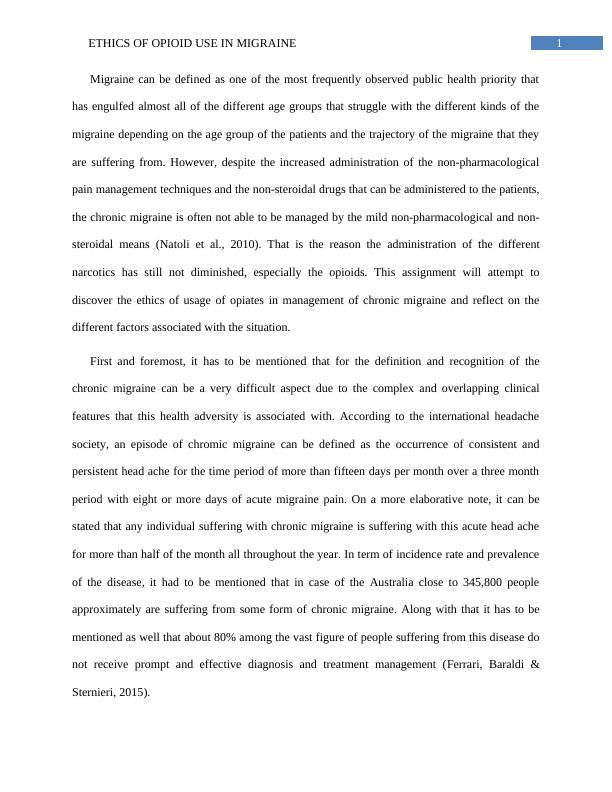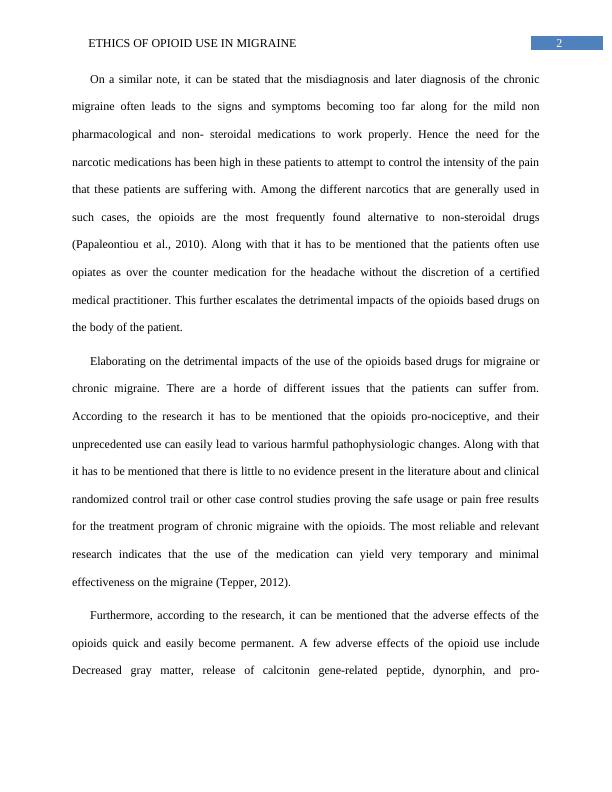Ethics of Opioid use in migraine
Added on 2021-04-21
7 Pages1563 Words27 Views
Running head: ETHICS OF OPIOID USE IN MIGRAINEEthics of Opioid use in migraineName of the student:Name of the university:Author note:

1ETHICS OF OPIOID USE IN MIGRAINEMigraine can be defined as one of the most frequently observed public health priority thathas engulfed almost all of the different age groups that struggle with the different kinds of themigraine depending on the age group of the patients and the trajectory of the migraine that theyare suffering from. However, despite the increased administration of the non-pharmacologicalpain management techniques and the non-steroidal drugs that can be administered to the patients,the chronic migraine is often not able to be managed by the mild non-pharmacological and non-steroidal means (Natoli et al., 2010). That is the reason the administration of the differentnarcotics has still not diminished, especially the opioids. This assignment will attempt todiscover the ethics of usage of opiates in management of chronic migraine and reflect on thedifferent factors associated with the situation. First and foremost, it has to be mentioned that for the definition and recognition of thechronic migraine can be a very difficult aspect due to the complex and overlapping clinicalfeatures that this health adversity is associated with. According to the international headachesociety, an episode of chromic migraine can be defined as the occurrence of consistent andpersistent head ache for the time period of more than fifteen days per month over a three monthperiod with eight or more days of acute migraine pain. On a more elaborative note, it can bestated that any individual suffering with chronic migraine is suffering with this acute head achefor more than half of the month all throughout the year. In term of incidence rate and prevalenceof the disease, it had to be mentioned that in case of the Australia close to 345,800 peopleapproximately are suffering from some form of chronic migraine. Along with that it has to bementioned as well that about 80% among the vast figure of people suffering from this disease donot receive prompt and effective diagnosis and treatment management (Ferrari, Baraldi &Sternieri, 2015).

2ETHICS OF OPIOID USE IN MIGRAINEOn a similar note, it can be stated that the misdiagnosis and later diagnosis of the chronicmigraine often leads to the signs and symptoms becoming too far along for the mild nonpharmacological and non- steroidal medications to work properly. Hence the need for thenarcotic medications has been high in these patients to attempt to control the intensity of the painthat these patients are suffering with. Among the different narcotics that are generally used insuch cases, the opioids are the most frequently found alternative to non-steroidal drugs(Papaleontiou et al., 2010). Along with that it has to be mentioned that the patients often useopiates as over the counter medication for the headache without the discretion of a certifiedmedical practitioner. This further escalates the detrimental impacts of the opioids based drugs onthe body of the patient. Elaborating on the detrimental impacts of the use of the opioids based drugs for migraine orchronic migraine. There are a horde of different issues that the patients can suffer from.According to the research it has to be mentioned that the opioids pro-nociceptive, and theirunprecedented use can easily lead to various harmful pathophysiologic changes. Along with thatit has to be mentioned that there is little to no evidence present in the literature about and clinicalrandomized control trail or other case control studies proving the safe usage or pain free resultsfor the treatment program of chronic migraine with the opioids. The most reliable and relevantresearch indicates that the use of the medication can yield very temporary and minimaleffectiveness on the migraine (Tepper, 2012). Furthermore, according to the research, it can be mentioned that the adverse effects of theopioids quick and easily become permanent. A few adverse effects of the opioid use includeDecreased gray matter, release of calcitonin gene-related peptide, dynorphin, and pro-

End of preview
Want to access all the pages? Upload your documents or become a member.
Related Documents
Nursing Ethical Issues: Chronic Migraine Treatment through Opiates and Opioid Medicationslg...
|7
|1754
|470
Assigmernt on the University of Queensland School Of Nursinglg...
|11
|2701
|20
Drug Pharmacologylg...
|19
|4035
|340
Diagnosis and Management Plan for Concussion in a 17-Year-Old Malelg...
|7
|661
|83
Effective Management of Chronic Pain: An Argumentative Analysis of Pain MedsCheck Programlg...
|8
|1860
|257
Assignment on Alternative Pain Managementlg...
|13
|3198
|124
